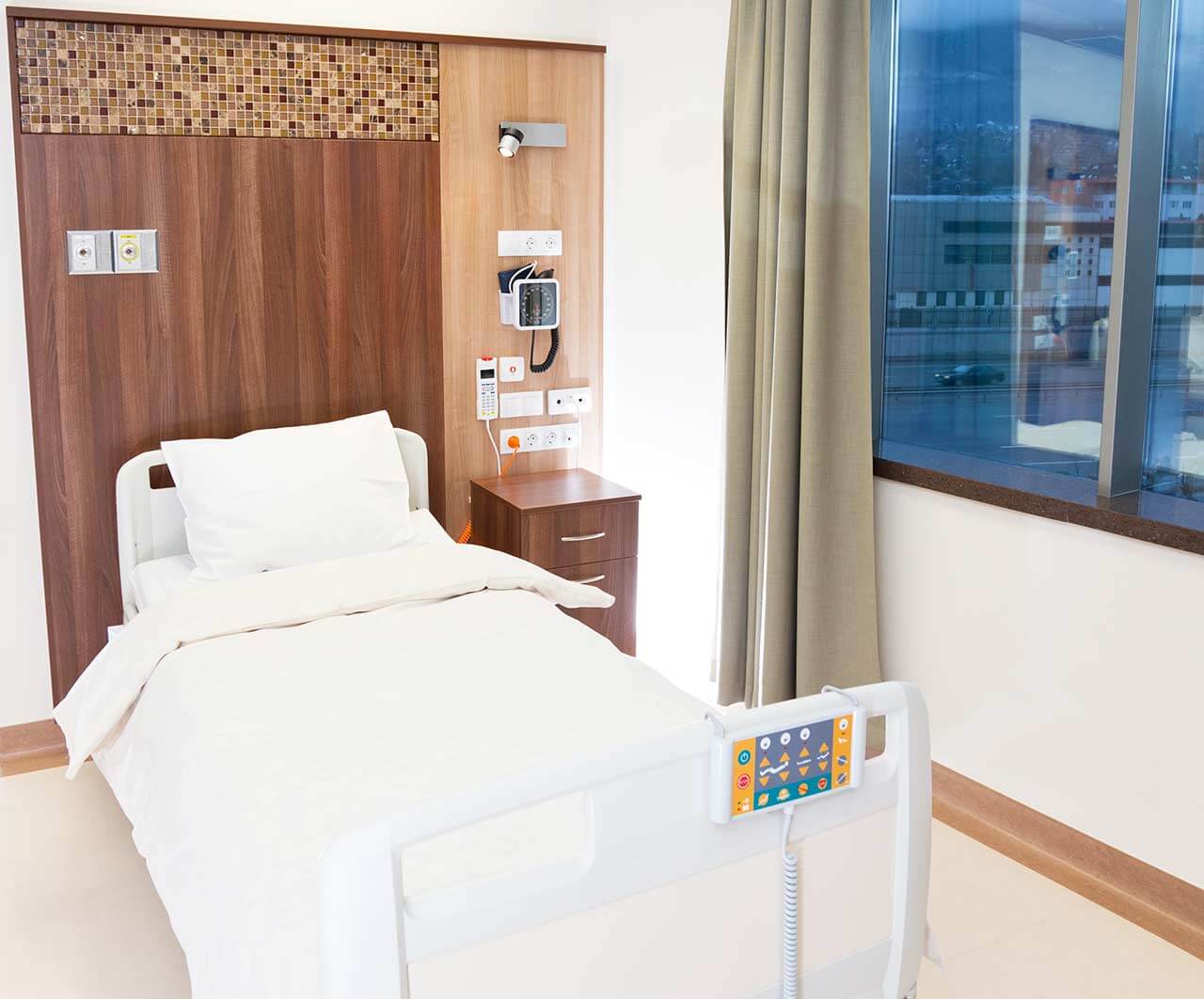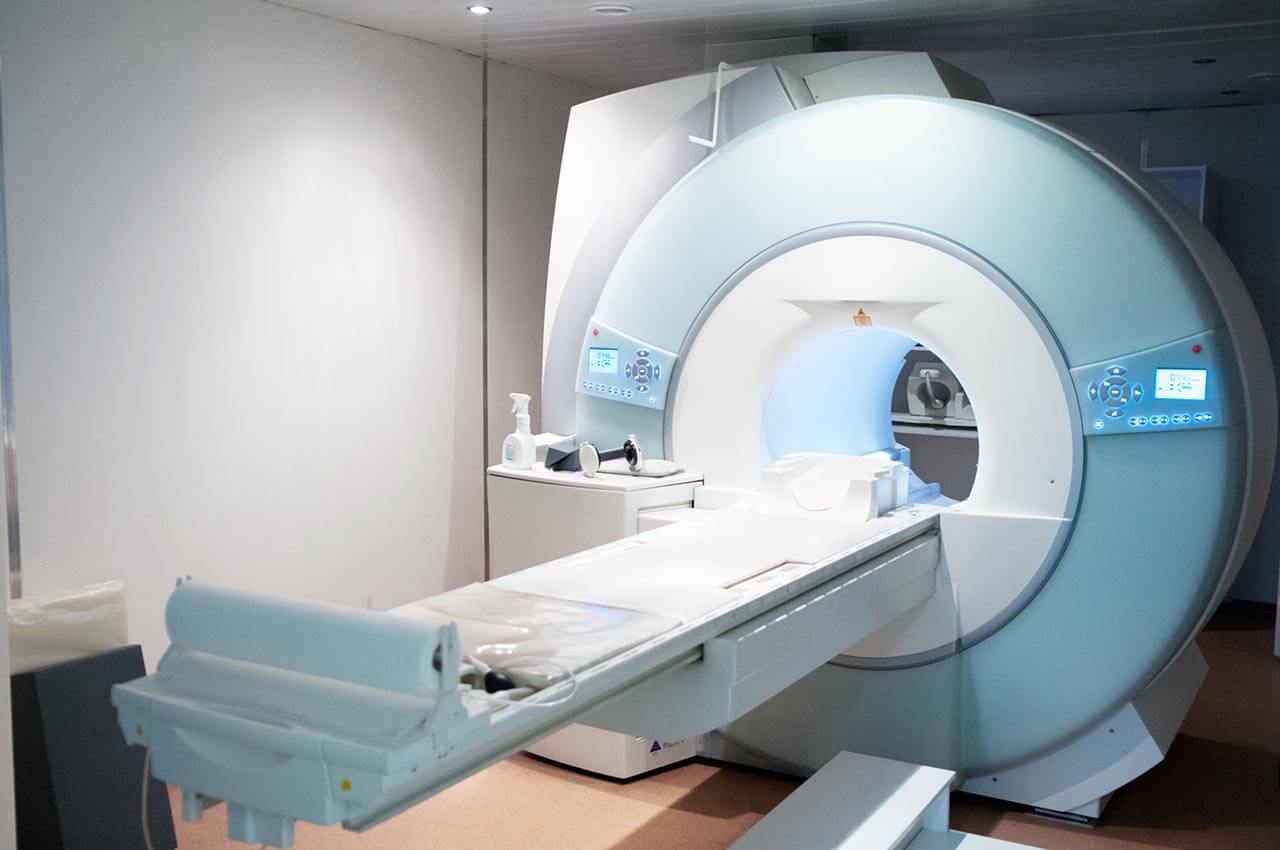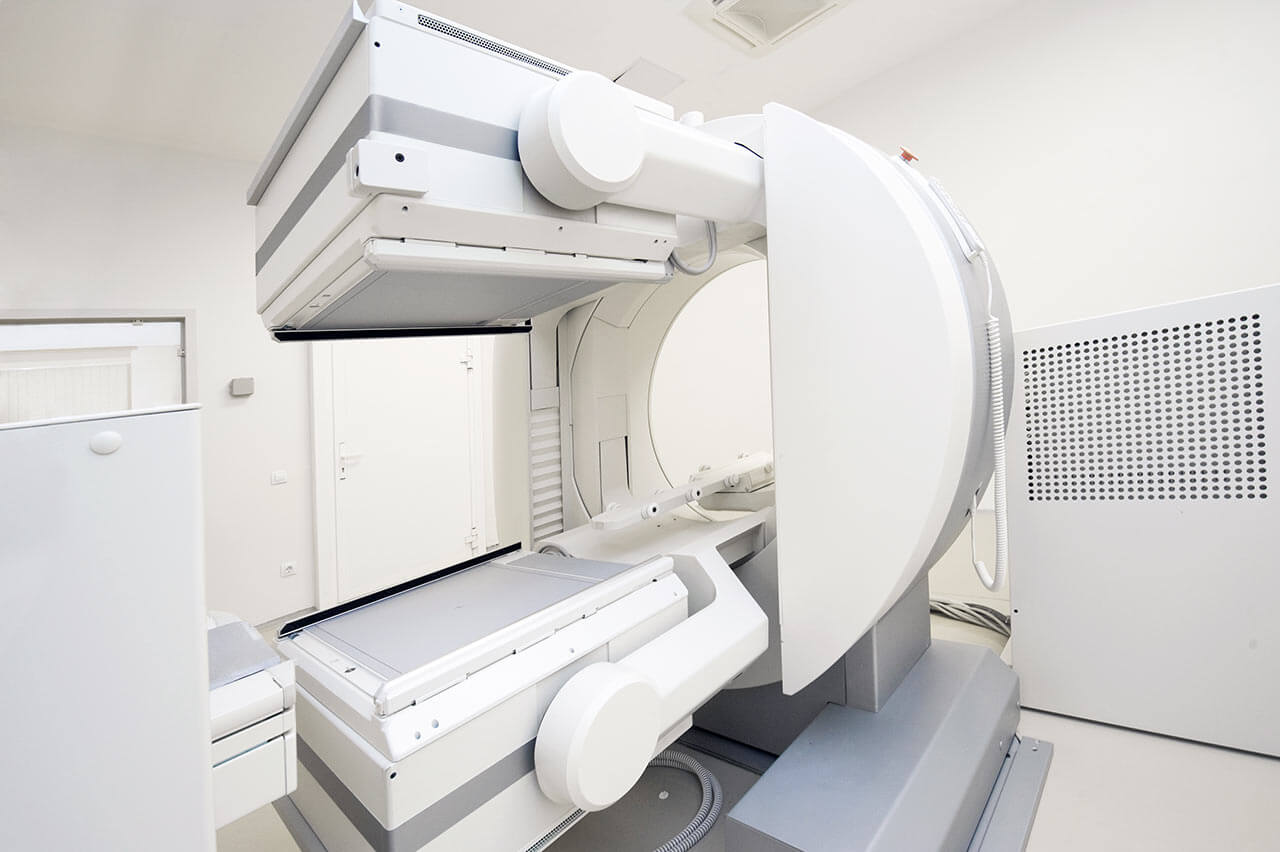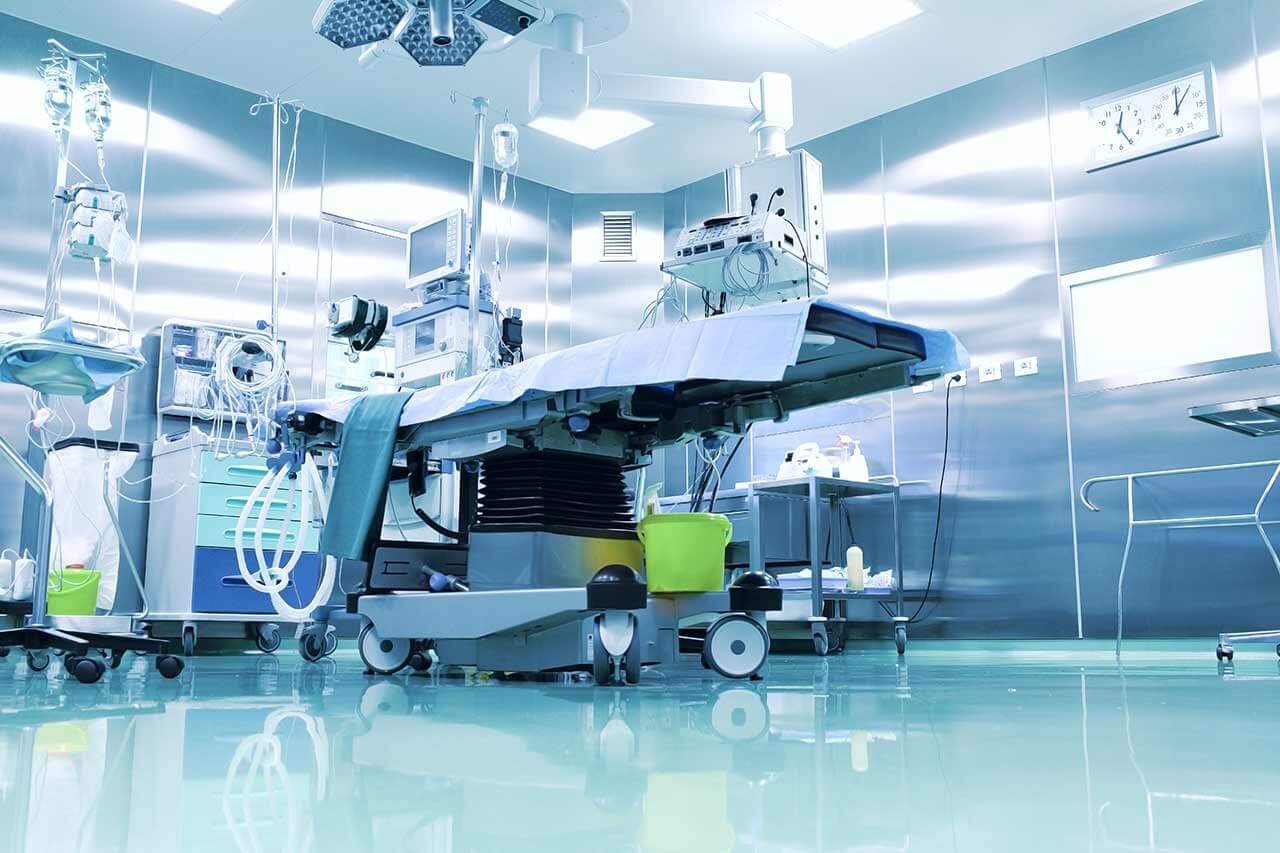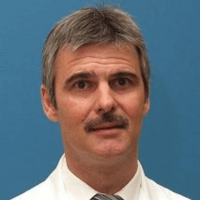
The program includes:
- Initial presentation in the clinic
- clinical history taking
- review of medical records
- physical examination
- laboratory tests:
- complete blood count
- general urine analysis
- biochemical analysis of blood
- TSH-basal, fT3, fT4
- tumor markers
- inflammation indicators (CRP, ESR)
- indicators of blood coagulation
- abdominal ultrasound scan
- CT scan/MRI or PET-CT of abdomen
- preoperative care
- cytoreductive surgery to remove visible tumors
inside the abdomen and HIPEC - histological and immunohistochemical
examination of removed tissues - symptomatic treatment
- cost of essential medicines
- nursing services
- stay in the hospital with a full board
- accommodation in a 2-bedroom ward
- elaboration of further recommendations
How program is carried out
During the first visit, the physician will conduct a clinical examination and go through the results of the available diagnostic tests. After that, you will undergo the necessary additional examination, such as the assessment of liver and kidney function, ultrasound scan and tomography of the abdominal organs. Based on the results of the examination, the physician will choose the surgical technique and the type of anesthesia. After that, preparation according to the preoperative standard will start.
Cytoreductive surgery begins with general anesthesia. The intervention is performed as open surgery, i.e. through the incision in the anterior abdominal wall, so that the surgeon can carefully examine the peritoneum and the surface of the abdominal organs. The surgeon removes affected by the malignant process areas of the peritoneum and metastases in other internal organs. This stage of the operation can take several hours, since the overall effectiveness of the treatment depends on the completeness of the malignant tissues removal.
At the next stage of the operation, the surgeon inserts several catheters into the abdominal cavity. Through the catheters, a heated solution of a chemotherapy drug is pumped inside. The special system maintains the required temperature (42-43 degrees Celsius), pressure and circulation rate of the medicinal solution. The solution mechanically flushes out blood clots and remnants of malignant tissues, and a heated chemotherapy drug destroys micrometastases in internal organs and lymph nodes (micrometastases can’t be detected by the naked eye).
After 1-1.5 hours, the chemotherapy drug is removed from the abdominal cavity and the abdominal cavity is washed with saline. After that, the surgeon removes the catheters and sutures the incision of the anterior abdominal wall.
After the completion of the operation, you will be transferred to the ward of the intensive care unit, under the round-the-clock supervision of doctors and nurses. In 1-3 days after the operation, your drains will be removed and you will be transferred to a regular ward for further recovery. The whole treatment takes 10-12 days on average.
Finally, the attending physician will evaluate the results of control examinations, schedule the date of discharge from the hospital and give you detailed recommendations for further follow-up and treatment.
Required documents
- Medical records
- X-ray examination, MRI/CT scan (if available)
- Pleural biopsy (if available)
Service
You may also book:
 BookingHealth Price from:
BookingHealth Price from:
About the department
The Department of Abdominal, Thoracic and Vascular Surgery at the University Hospital Marburg UKGM offers all modern surgical interventions in these fields. Specialization covers the treatment of diseases of the abdominal organs, endocrine glands, pathologies of the lungs and chest wall, pathological vascular lesions of all parts of the body. In addition, kidney transplantation and pancreas transplantation are part of the surgeons' tasks. Whenever possible, operations are performed using minimally invasive techniques that have several advantages over classical interventions.
The department is headed by Prof. Dr. med. Detlef K. Bartsch. According to the rating of the Focus magazine, the doctor is on the list of the best specialists in the field of endocrine and abdominal surgery!
The department pays particular attention to cancer surgery. It performs surgery in patients with malignant tumors of the entire digestive tract (esophagus, stomach, liver, biliary tract and gallbladder, pancreas, small and large intestine), lungs and mediastinal organs, as well as endocrine glands (thyroid gland, adrenal glands, pancreas). In 2017, the department’s specialists performed more than 3,700 operations on the abdominal organs.
Another important focus of the department’s work is endocrine surgery. The department has an excellent national and international reputation in the field of research on the etiology and treatment of endocrine diseases. Due to the high treatment efficiency and excellent results of surgical interventions, the department is one of 4 Reference Centers for Endocrine Surgery certified by the German Society for General and Abdominal Surgery and the Center of Competence (1 of 20 in Europe) of the European Neuroendocrine Tumor Society (ENETS).
Many extensive interventions are performed on an outpatient basis. The most common indications for outpatient surgery are inguinal and umbilical hernias, installation or removal of catheters for chemotherapy, diagnostic removal of lymph nodes, removal of superficial tumors, etc.
More and more operations are performed using laparoscopic or robotic techniques, minimally invasively. The advantages of laparoscopy are not only in the cosmetic aspect. After such interventions, pain is less pronounced, patients can quickly return to their normal motor activities and they are less likely to suffer from wound infections or ventral hernias.
The main clinical focuses of the department include:
- Cancer surgery
- Colorectal cancer
- Familial pancreatic cancer
- Gastrointestinal neuroendocrine tumors
- Pancreatic neuroendocrine tumors
- Pancreatic cancer
- Esophageal cancer
- Stomach cancer
- Endocrine surgery
- All thyroid diseases, including diffuse toxic goiter
- Parathyroid diseases
- Primary hyperparathyroidism (primary hyperfunction)
- Secondary hyperparathyroidism (secondary hyperfunction)
- Parathyroid cancer
- Adrenal diseases
- Conn's syndrome
- Cushing's syndrome
- Pheochromocytoma
- Pancreatic neuroendocrine tumors
- Insulinomas
- Gastrinomas
- Neuroendocrine tumors of the gastrointestinal tract, thymus gland
- Multiple endocrine neoplasias (MEN I and II syndrome)
- Pancreatic surgery
- Pancreatic cancer, including familial cancer
- Pancreatic neuroendocrine tumors
- Esophageal surgery
- Inflammatory processes (esophagitis)
- Esophageal stenosis
- Esophageal diverticulum
- Achalasia cardia
- Reflux disease
- Esophageal tumors
- Stomach surgery
- Gastritis
- Peptic ulcer
- Esophageal hernia
- Stomach tumors
- Colorectal surgery
- Ulcerative colitis
- Colorectal cancer
- Sigmoid diverticulitis
- Colon and rectal diseases
- Robot-assisted surgery (Da Vinci)
- Removal of benign pancreatic tumors
- Treatment of hernias of the anterior abdominal wall, incisional hernias
- Stomach tumors
- Esophageal tumors
- Vascular surgery
- Peripheral artery disease in the lower limbs
- Carotid stenosis
- Varicose veins
- Vascular aneurysms
- Dialysis access formation
- Thoracic surgery
- Laser surgery of lung metastases
- Surgical and conservative treatment of neuroendocrine lung tumors
- Resection of progressive lung tumors (also using a heart-lung, vascular prosthetics)
- Mediastinal tumors, including thymus surgery
- Minimally invasive thoracic surgery
- Tracheobronchial resection (in collaboration with the Department of Otolaryngology)
- Surgical interventions for emphysema
- Transplant surgery
- Kidney transplantation
- Pancreas transplantation
- Minor interventions
- Gallbladder removal
- Treatment of hernias of the anterior abdominal wall, incisional hernias, inguinal and umbilical hernias
- Removal of small tumors or superficial lymph nodes
- Appendix removal
- Implantation and removal of catheters for chemotherapy or peritoneal dialysis
- Outpatient surgery
- Other therapeutic options
Curriculum vitae
Education and Professional Career
- 1983 - 1990 Study of Human Medicine at the Universities of Aachen, Tuebingen, Duesseldorf.
- 1991 Doctoral thesis defense, Heinrich Heine University Duesseldorf.
- 1991 Admission to medical practice.
- 1991 - 1994 Research Fellow in the Department of General Surgery at the University Hospital Marburg UKGM.
- 1991 Certified rescue service physician, Medical Association of North Rhine.
- 1994 - 1996 Scholarship of the German Research Foundation, Department of Surgery, Faculty of Medicine, University of Washington, St. Louis, USA.
- Since 1996 Research Fellow in the Department of General, Thoracic and Vascular Surgery at the University Hospital Marburg UKGM.
- 1998 Training course for project managers in genetic engineering in accordance with §15 (4) GenTSV.
- 1999 Board certification in Surgery, Medical Association of North Rhine.
- 1999 Habilitation in Surgery.
- 1999 Appointment as Senior Physician in the Department of General, Thoracic and Vascular Surgery at the University Hospital Marburg UKGM.
- 2001 - 2002 Training course in business administration for doctors, diploma in health economics.
- 2003 Leading Senior Physician in the Department of General, Thoracic and Vascular Surgery at the University Hospital Marburg UKGM.
- 2003 Additional specialization in Abdominal Surgery.
- 2003 Certified KTQ training course for hospital staff.
- 10.2004 Extraordinary Professor, Philipps University of Marburg.
- 06.2005 - 04.2008 Head of the Department of General and Abdominal Surgery, Municipal Hospital Bielefeld-Mitte.
- 06.2006 Theoretical basics of the specialty in Radiation Protection, Medical Association of North Rhine.
- Since 02.2008 Additional specialization in the Thoracic Surgery.
- Since 05.2008 Head of the Department of General, Thoracic and Vascular Surgery at the University Hospital Marburg UKGM.
- Since 03.2012 Member of the ENETS Advisory Board.
- 11.2015 - 11.2018 Chairman of the Surgical Association of Endocrinology (CAEK).
Clinical Focuses
- Gastrointestinal cancer surgery (special focus on pancreatic, stomach, colon and rectal surgery).
- Endocrine surgery (interventions on the thyroid gland, parathyroid glands, pancreas, resection of carcinoid tumors).
- Minimally invasive surgery.
Memberships in Professional Societies
- German Society of Surgery.
- German Society of Abdominal Surgery.
- Surgical Working Group on Molecular Oncology (CAMO).
- Surgical Research Section of the German Society of Surgery.
- German Pancreatic Club (Deutscher Pancreas Club).
- European Pancreatic Club.
- International Association of Pancreatology.
- Surgical Working Group on Endocrinology (CAEK).
- Surgical Working Group on Oncology (CAO).
- German Cancer Society.
- 04.2003 - 04.2005 Representative of the Society of Abdominal Surgery in the Board of the Surgical Research Section of the German Society of Surgery.
Photo of the doctor: (c) UKGM - Universitätsklinikum Gießen und Marburg GmbH
About hospital
The University Hospital Marburg UKGM offers patients modern diagnostics and comprehensive therapy at the international level. As a maximum care hospital, the medical facility specializes in all fields of modern medicine ranging from ophthalmology to traumatology and dentistry. The main areas of specialization of the hospital are surgery, neurosurgery, oncology, nephrology with kidney transplantation and children's medicine.
The hospital is the third largest in Germany. Every year, more than 436,000 patients are treated in two locations of the hospital (Giessen and Marburg): 342,000 in outpatient and 94,000 inpatient settings. The medical facility is the first privatized university hospital in the country.
The hospital staff makes a significant contribution to the development of research activities at the Faculty of Medicine of the Justus Liebig University Giessen and the Philipps University of Marburg. To develop new diagnostic and therapeutic methods, as well as to implement them into clinical practice, the specialists maintain active cooperation in a large number of areas.
The widest range of diagnostic and therapeutic services, the advanced infrastructure and technical base, high quality of treatment and professionalism of health workers contribute to the fact that the medical facility has an excellent reputation not only in Germany, but also far beyond its borders.
Photo: (c) depositphotos
Accommodation in hospital
Patients rooms
The patients of the University Hospital Marburg UKGM live in comfortable single and double rooms made in a modern design and light colors. Each room has an ensuite bathroom with shower and toilet. The pediatric departments provide patient rooms for the joint accommodation of mother and child. The standard room furnishing includes an automatically adjustable bed, bedside table, wardrobe, TV, telephone.
Meals and Menus
The patients of the hospital are offered balanced, healthy three meals a day: buffet breakfast, lunch and dinner. The private kitchen, certified according to DIN EN ISO 9001: 2000, is responsible for providing patients with food and drinks.
If for some reason you do not eat all foods, you will be offered an individual menu. The hospital also has a cafeteria with a large assortment of hot and cold drinks, snacks and desserts.
Further details
Standard rooms include:
Television
All patient rooms are equipped with TV sets. If you have some questions about TV use, please contact medical personnel.
Religion
Religious services can be provided upon request.
Accompanying person
During an inpatient program, an accompanying person can stay with you in a patient room or in a hotel of your choice.
Hotel
During the outpatient program, you can stay at the hotel of your choice. Our managers will help you choose the most suitable option.
